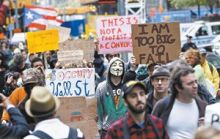Last weekend, demonstrations of protest against financial institutions and government budget cuts took place in 950 cities in 82 countries. A worldwide action of protest under anticapitalist slogans appears to have taken place for the first time over the past several decades. The Occupy Wall Street demonstrations started last month in Lower Manhattan as a “global day of action against Wall Street greed,” quickly extended to other US cities, and last weekend went global, getting violent in some countries.
In New York, the police made some 70 arrests [92 according to the NYPD official statement later] for disorderly conduct during the night (the organizers claimed some five thousand persons took part in the demonstration). In London, about 250 protesters put up some 70 tents in front of St. Paul’s Cathedral and declared they would stay there for as long as it would take, emulating New York’s Occupy Wall Street example. That same night tens of thousands filled Puerta del Sol, the central square of Madrid, among them people of all age groups, particularly young unemployed individuals. In Portugal, over 20,000 took part in a march of protest in Lisbon, with about as many following suit in the second largest city, Porto. In Athens, 2,000 protesters gathered in front of the parliament building. Demonstrations of protest were held in Canada and Latin America, also in Tokyo, Sydney, and Hong Kong. In many European cities such demonstrations remained peaceful, but not in Rome where 135 persons (including 105 policemen) suffered body injuries in the course of public disturbances. The police are pressing violation-of-public-peace charges against at least 20 protesters currently held in custody. According to Mayor Gianni Alemanno, The Day of protests cost Rome and its residents over a million euros. Most damage was caused by malefactors wearing hoods when they started setting fire to cars and attacking banks, business offices, even 18th-century churches. Italians are in a state of shock, stunned by the fact that several hundred aggressive individuals, mostly dressed in black, sporting crash helmets, succeeded in wreaking havoc on the capital city. Interior Minister Roberto Maroni called for meting out severe legal punishments to all those responsible, so others like them could learn this lesson. He added that he would address the Senate on the matter on Tuesday.
A number of analysts are trying to figure out the reason behind this wave of protests under slogans for global democracy and against corporate greed. Dr. John Downing, the founder of the Global Media Research Center, told Le Devoir that today’s global protest movements — among them the Zapatista Army of National Liberation or the anti-globalization movement — are a sequel to the social justice series. He was cautious in assessing the protesters’ chances, saying our planet is gradually restructuring, perhaps doing so too slowly; that this will be a long, hard, and painful process which is impossible without working out a clear-cut policy. He stressed that the revolutionary cycle takes a very long time, that the movement aimed at revising capitalism is in its initial phase, although the emergence of social networks may expedite the process. It’s too early to discuss the results of the revision of capitalism. The main inference from the global action of protest is that, according to http://www.gazeta.ru/ (e.g., “Love of Domestic Sharks”), “…the civic basis of people’s communal mentality and collective effort is still there, allowing these countries hope that their societies will find a way out of this crisis, instead of being imposed a solution to this problem from ‘upstairs’ or as dictated by spontaneous external circumstances… The Russian in the street has been taught to regard himself not as a citizen but as a human being who totally depends on the will and whim of those who have authority and wealth. To him it is almost natural to see all those ranking bureaucrats and businessmen live in a different world, one of incredible luxury. He is no longer surprised to watch and hear about Putin’s palaces or Gazprom CEO Miller’s projects with their mind-boggling budgets.”
Largely, the same applies to Ukraine. One can only hope Ukraine will learn its lesson from the Occupy Wall Street demonstrations, discard their servile mentality, and replace it with one shared by citizens of a true nation-state, so they can feel and voice their outrage watching [a handful of fellow citizens] live in a different world inhabited by people basking in power and wealth.








